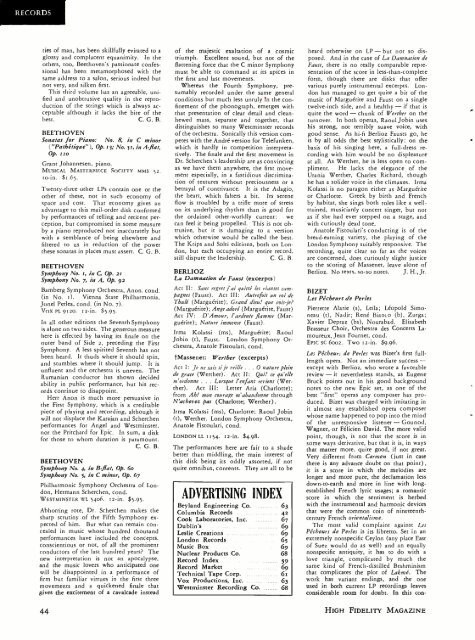Aug - AmericanRadioHistory.Com
Aug - AmericanRadioHistory.Com
Aug - AmericanRadioHistory.Com
Create successful ePaper yourself
Turn your PDF publications into a flip-book with our unique Google optimized e-Paper software.
RI-(<br />
ties of man, has been skillfully evirated to a<br />
glossy and complacent equanimity. In the<br />
others, too, Beethoven's passionate confessional<br />
has been metamorphosed with the<br />
same address to a salon, serious indeed but<br />
not very, and silken first.<br />
This third volume lias an agreeable, unified<br />
and unobtrusive quality in the reproduction<br />
of the strings which is always acceptable<br />
although it lacks the bite of the<br />
best. C. G. B.<br />
BEETHOVEN<br />
Sonatas for Piano: No. 8, in C minor<br />
( "Pathétique"), op. i 3; No. 3r, in A-flat,<br />
Op. iio<br />
Grant Johannesen, piano.<br />
MUSICAL MASTERPIECE. SOCIETY MMS 52.<br />
Io -in. $1.65.<br />
Twenty -three other LPs contain one or the<br />
other of these, not in such economy of<br />
space and cost. That economy gives an<br />
advantage to this mail -order disk confirmed<br />
by performances of telling and reticent perception,<br />
but compromised in some measure<br />
by a piano reproduced not inaccurately but<br />
with a semblance of being elsewhere and<br />
filtered to us in reduction of the power<br />
these sonatas in places must assert. C. G. B.<br />
BEETHOVEN<br />
Symphony No. r, in C, Op. 21<br />
Symphony No. 7, in A, Op. 92<br />
Bamberg Symphony Orchestra, Anon. cond.<br />
(in No. I). Vienna State Philharmonia,<br />
Jonel Perlea, cond. (in No. 7).<br />
Vox PL 912o. 12 -in. $5.95.<br />
In all other editions the Seventh Symphony<br />
is alone on two sides. The generous measure<br />
here is effected by having its finale on the<br />
outer band of Side 2, preceding the First<br />
Symphony. A less spirited Seventh has not<br />
been heard. It thuds where it should spin,<br />
and stumbles where it should jump. It is<br />
unfluent and the orchestra is uneven. The<br />
Rumanian conductor has shown decided<br />
ability in public performance, but his records<br />
continue to disappoint.<br />
Herr Anon is much more persuasive in<br />
the First Symphony, which is a creditable<br />
piece of playing and recording, although it<br />
will not displace the Karajan and Scherchen<br />
performances for Angel and Westminster,<br />
nor the Pritchard for Epic. In sum, a disk<br />
for those to whom duration is paramount.<br />
C. G. B.<br />
BEETHOVEN<br />
Symphony No. 4, in B-flat, Op. 6o<br />
Symphony No. 5, in C minor, Op. 67<br />
Philharmonic Symphony Orchestra of London,<br />
Hermann Scherchen, cond.<br />
WESTMINSTER WL 5406. I2 -in. $5.95.<br />
Abhorring rote, Dr. Scherchen makes the<br />
sharp scrutiny of the Fifth Symphony expected<br />
of him. But what can remain concealed<br />
in music whose hundred thousand<br />
performances have included the concepts.<br />
conscientious or not, of all the prominent<br />
conductors of the last hundred years? The<br />
new interpretation is not an apocalypse,<br />
and the music lovers who anticipated one<br />
will be disappointed in a performance of<br />
firm but familiar virtues in the first three<br />
movements and a quickened finale that<br />
gives the excitement of a cavalcade instead<br />
44<br />
of the majestic exaltation of a cosmic<br />
triumph. Excellent sound, but not of the<br />
flattening force that the C minor Symphony<br />
must be able to command at its apices in<br />
the first and last movements.<br />
Whereas the Fourth Symphony, presumably<br />
recorded under the same general<br />
conditions but much less unruly In the confinement<br />
of the phonograph, emerges with<br />
that presentation of clear detail and clean -<br />
hewed mass, separate and together, that<br />
distinguishes so many Westminster records<br />
of the orchestra. Sonically this version competes<br />
with the André version for Telefunken,<br />
which is hardly in competition interpretatively.<br />
The finale and the first movement in<br />
Dr. Scherchen's leadership are as convincing<br />
as we have them anywhere, the first movement<br />
especially, in a fastidious discrimination<br />
of textures without preciousness or a<br />
betrayal of contrivance. It is the Adagio,<br />
the heart, which falters a bit. Its serene<br />
flow is troubled by a trifle more of stress<br />
on its underlying rhythm than is good for<br />
the ordained other -worldly current: we<br />
can feel it being propelled. This is not obtrusive,<br />
but it is damaging to a version<br />
which otherwise would be called the best.<br />
The Krips and Sold editions, both on London,<br />
but each occupying an entire record,<br />
still dispute the leadership. C. G. B.<br />
BERLIOZ<br />
La Damnation de Faust (excerpts)<br />
Act II: Sans regret j'ai quitté les riantes campagnes<br />
(Faust). Act III: Autrefois un roi de<br />
Thulé (Marguérite); Grand dieu! que vois-je?<br />
(Marguérite); Angeadoré (Marguérite, Faust)<br />
Act IV: D'Amour, ¡ardente flamme (Marguérite);<br />
Nature immense (Faust).<br />
Irma Kolassi (ms), Marguérite; Raoul<br />
Jobin (t), Faust. London Symphony Orchestra,<br />
Anatole Fistoulari, cond.<br />
tMassenet: Werther (excerpts)<br />
Act I: Je ne sais si je veille ... 0 nature plein<br />
de grace (Werther). Act II: Qui! ce qu'elle<br />
m'ordonne ... Lorsque ¡enfant revient (Werther).<br />
Act Ill: Letter Aria (Charlotte);<br />
from Ah! mon courage m'abandonne through<br />
N'achevez pas (Charlotte; Werther).<br />
Irma Kolassi (ms), Charlotte; Raoul Jobin<br />
(t), Werther. London Symphony Orchestra,<br />
Anatole Fistoulari, cond.<br />
LONDON LL t 154. 12 -in. $4.98.<br />
The performances here are fair to a shade<br />
better than middling, the main interest of<br />
this disk being its oddly assorted, if not<br />
quite omnibus, contents. They are all to be<br />
ADVERTISING INDEX<br />
Beyland Engineering Co. 63<br />
Columbia Records 42<br />
Cook Laboratories, Inc. 67<br />
Dublin's 69<br />
Leslie Creations .. __ _....., _ _ _ 69<br />
London Records<br />
_ 65<br />
Music Box 69<br />
Nuclear Products Co. 68<br />
Record Index _ 59<br />
Record Market _ 69<br />
Technical Tape Corp.<br />
6r<br />
Vox Productions, Inc. .. 63<br />
Westminster Recording Co. 68<br />
heard otherwise on LP - but not so disposed.<br />
And in the case of La Damnation de<br />
Faust, there is no really comparable representation<br />
of the score in less -than -complete<br />
form, though there are disks that offer<br />
various purely instrumental excerpts.<br />
Lon-<br />
don has managed to get quite a bit of the<br />
music of Marguérite and Faust on a single<br />
twelve -inch side, and a healthy - if that is<br />
quite the word - chunk of Werther on the<br />
turnover. In both operas, Raoul Jobin uses<br />
his strong, not terribly suave voice, with<br />
good sense. As hi -fi Berlioz Fausts go, he<br />
is by all odds the best stylistically: on the<br />
basis of his singing here, a full -dress re-<br />
cording with him would be no displeasure<br />
at all. As Werther, he is less open to compliment.<br />
He lacks the elegance of the<br />
Urania Werther, Charles Richard, though<br />
he has a solider voice in the climaxes. Irma<br />
Kolassi is no paragon either as Marguérite<br />
or Charlotte. Greek by birth and French<br />
by habitat, she sings both roles like a well -<br />
trained, musicianly concert singer, but not<br />
as if she had ever stepped on a stage, and<br />
with curiously dead tone.<br />
Anatole Fistoulari's conducting is of the<br />
bread -earning variety, the playing of the<br />
London Symphony suitably responsive. The<br />
recording, quite clear so far as the voices<br />
are concerned, does curiously slight justice<br />
to the scoring of Massenet, leave alone of<br />
Berlioz. No texts, so-so notes. J. H., Jr.<br />
BIZET<br />
Les Pécheurs de Perles<br />
Pierrette Alarie (s), Leila; Léopold Simoneau<br />
(t), Nadir; René Bianco (b), Zurga:<br />
Xavier Depraz (bs), Nourabad. Elisabeth<br />
Brasseur Choir, Orchestra des Concerts Lamoureux,<br />
Jean Fournet, cond.<br />
EPIC SC 6002. Two I2 -in. $9.96.<br />
Les Pécheur. de Perles was Bizets first full length opera. Not an immediate success -<br />
except with Berlioz, who wrote a favorable<br />
review - it nevertheless stands, as Eugene<br />
Bruck points out in his good background<br />
notes to the new Epic set, as one of the<br />
best "first" operas any composer has produced.<br />
Bizet was charged with imitating in<br />
it almost any established opera composer<br />
whose name happened to pop into the mind<br />
of the unresponsive listener - Gounod.<br />
Wagner, or Félicien David. The more valid<br />
point, though, is not that the score is in<br />
some ways derivative, but that it is, in ways<br />
that matter more. quite good, if not great.<br />
Very different from Carmen (just in case<br />
there is any advance doubt on that point),<br />
it is a score in which the melodies are<br />
longer and more pure, the declamation less<br />
down -to -earth and more in line with long -<br />
established French lyric usages; a romantic<br />
score in which the sentiment is herbed<br />
with the instrumental and harmonic devices<br />
that were the common coin of nineteenth -<br />
century French orientalisme.<br />
The most valid complaint against Les<br />
Pécheurs de Perles is its libretto. Set in an<br />
extremely nonspecific Ceylon (any place East<br />
of Suez would do as well) and an equally<br />
nonspecific antiquity, it has to do with a<br />
love triangle, complicated by much the<br />
same kind of French -distilled Brahminism<br />
that complicates the plot of Lakmé. The<br />
work has variant endings, and the one<br />
used in both current LP recordings leaves<br />
considerable room for doubt. In this con-<br />
HIGH FIDELITY MAGAZINE
















